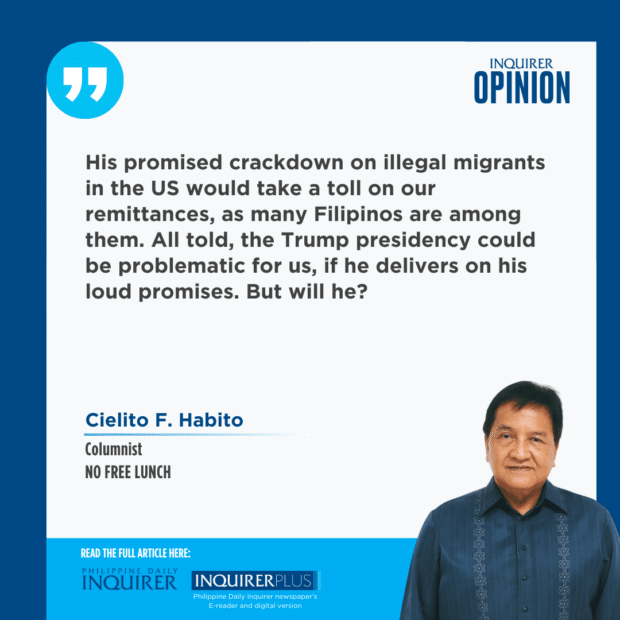Trump and our economy

I’ve deliberately held back on writing on how Donald Trump’s election victory in the United States would affect us, for three reasons. First, a flurry of writings on the outlook for the second Trump presidency quickly followed the US election. So I thought I’d adopt a listening mode first and weigh what everyone else was saying. Second, I found it fascinating that some analysts had directly opposing views, especially on how far Trump would support us vs China in the West Philippine Sea. Third, I find it hard to second-guess Trump on his economic policy directions, as he does not seem firmly grounded on a clear set of economic principles, making him less predictable. He has in fact led the Republican Party away (and astray?) from its age-old capitalistic free-market/free-trade philosophy by espousing the traditionally Democrat line of trade protectionism.
Part of it may come from lack of full understanding of the consequences of his promised economic directions, especially on trade, fiscal, and monetary policies. Worse, many see him to be unwilling to learn because he thinks he already knows everything. He has declared many times that he knows more about various things than everyone else. The internet is replete with quotes from his talks and interviews declaring that he is the smartest person in the room on virtually any topic raised to him. This reportedly worries his own people, as it means he would be unreceptive to advice, even if surrounded by the most competent advisers. President Ronald Reagan, in contrast, humbly and openly stated that he often wasn’t the smartest man in the room—but quickly added that he knew how to hire smart people, and when to listen to them.
What will he do on the economy? He promises a whole array of tax cuts, including lifting caps on tax deductions, and toys with the idea of dropping the federal income tax and replacing it with import tariffs. He says he will impose an across-the-board tariff of 10 or 20 percent on all imports into the US, and raise them up to 60 percent for imports from China and 25 percent from Mexico. He has also floated a 100- or 200-percent tariff on cars made in Mexico, or on all products made by US firms that move manufacturing operations to Mexico. New Mexican President Claudia Sheinbaum warns him that the planned tariffs “put our common businesses at risk,” and she is right.
Article continues after this advertisementBlaming the Biden-Harris administration for soaring prices, Trump has vowed to reduce prices of fuel, groceries, and other essentials, with little explanation on how. He promises to boost oil and gas production and allow more drilling, but seems to forget that prices consumers pay at the pump depend highly on the global oil market, from which the US oil market is not insulated. And his obsession with protective tariffs runs counter to his promise of lower prices. He describes tariffs as a multiuse tool to punish other countries for unfair trade practices, prevent US companies from moving overseas, and bring in billions of dollars to reduce the federal deficit. But he neglects how they would hit US firms and consumers with higher costs of imported inputs and consumer goods, leading to the same price inflation he vows to reverse. Higher inflation could force the US Federal Reserve to raise interest rates anew, even as this is also something Trump has vowed to lower (yet cannot directly control) to reduce mortgage costs of homeowners and stimulate business. Higher US interest rates in turn have unwelcome repercussions on worldwide interest rates and exchange rates, as seen in the aftermath of the COVID-19 pandemic.
So how will our economy fare under the Trump presidency? The US is important to us in trade (we export more to them than we import), direct invesments (they are among our top five sources), and remittances (they are our top source). Trump says he will hike tariffs on imports from countries the US has a trade deficit with, and that includes us. So unless we’re spared for political considerations, we will get hit. Firms will move out of China to avoid Trump’s punitive tariffs on imports from that country, but it remains a struggle to attract them to move here. His promised crackdown on illegal migrants in the US would take a toll on our remittances, as many Filipinos are among them. All told, the Trump presidency could be problematic for us, if he delivers on his loud promises.
But will he? I’ve long had a black blazer that I found in a US bargain basement, with not just a label at the collar but an impressive little brass medallion attached with brass chains, proudly embossed “Donald Trump Collection.” Right underneath it is a label that reads: “Made in China.” And I’ve seen a photo of a similar blazer posted in social media where the label said “Made in Mexico.” That speaks volumes to me.
Article continues after this advertisement—————-
cielito.habito@gmail.com
















